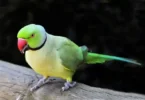Life is full of surprises, both pleasant and challenging. For the birdwatcher, witnessing the beauty and melodies of birds can be a source of immense joy. However, sometimes, during the peaceful songs of these feathered creatures, an unexpected event occurs: bird screaming.
Bird Screaming: Tale of Overcoming Challenges and Finding Peace
In this article, we delve into the fascinating and touching journey of the author and a bird lover who faced this unusual difficulty. See how the author discovered a way to overcome it, finding peace in the process.
Our author, Mark (Note: The author’s name is indicative in this article), has been an enthusiastic birdwatcher since childhood. His love for birds and their songs grew stronger with each passing year. He spent countless hours observing them in their natural habitats. He learned about different species and tried to mimic their melodious calls.
For Mark, waking up to the sweet symphony of birds singing in his garden was one of life’s greatest joys. Bird songs helped him start his day on a positive note. It helps him feel a sense of connection to nature.
Unsettling Experience of Bird Screaming
One bright morning, as Mark was sipping his coffee on the porch, he noticed an unusual and harsh sound cutting through the otherwise harmonious chorus of birds. It was a bird screaming with distress, and the sound was deeply unsettling.
Determined to help, Mark followed the distress call to find the bird in need. He discovered a small, injured bird entangled in a piece of discarded plastic. It was struggling to free itself, and its distressed cries pierced Mark’s heart.
Gently and carefully, Mark untangled the bird, cradling it in his hands. He rushed it to a nearby wildlife rescue center, where they provided medical care and rehabilitation. Mark couldn’t help but wonder about the impact of human actions on these delicate creatures.
The Emotional Impact and Perseverance
The incident had a profound effect on Mark. He couldn’t get the bird’s screaming out of his mind, and he became increasingly aware of the threats birds face due to pollution and habitat destruction.
Determined to make a difference, Mark joined local conservation groups and began actively participating in efforts to protect birds and their natural habitats. He shared his experience with others to raise awareness about the importance of responsible waste disposal.
As Mark engaged in these activities, he found solace in knowing that he was doing his part to protect the birds he loved so dearly. While the incident still lingered in his memory, he realized that it had ignited a passion for bird conservation within him.
Bird Screaming: Overcoming the Fear
After the incident, Mark developed a fear that he might witness another bird-screaming episode. This fear sometimes held him back from enjoying his birdwatching hobby to the fullest.
Mark sought support from fellow birdwatchers who had faced similar fears. Their encouragement and stories of resilience helped him understand that fears could be conquered, and experiences like these were part of the larger journey of birdwatching.
The Renewed Joy
With time and effort, Mark overcame his fear and found renewed joy in birdwatching. He appreciated every song, every chirp, and every moment spent with these delightful creatures.
In the face of unexpected challenges, Mark’s journey of bird screaming transformed him from a mere observer to an active advocate for bird conservation. He overcame his fear and found peace by channeling his passion into meaningful action.
Addressing Excessive Pet Bird Screaming
Now we will delve into the valuable insights and practical solutions to help you address this common issue with your avian companion. Bird screaming can be quite distressing for both pet owners and their feathered friends. We will equip you with the knowledge and techniques to effectively manage and reduce excessive bird vocalization.
The Nature of Pet Bird Screaming
Pet birds are highly social creatures, and vocalization is an integral part of their communication. In the wild, birds use vocalizations to establish territories, find mates, and alert others to potential dangers. When brought into a home environment, the reasons behind their screams can vary and may include:
- Attention-Seeking: Birds may scream to gain attention from their owners, especially if they feel neglected or bored.
- Mimicking Sounds: Certain birds are skilled mimics and may scream to imitate sounds they hear in their surroundings.
- Fear and Stress: Changes in the environment, new people, or loud noises can cause birds to feel anxious and express their distress through screaming.
- Hormonal Behavior: During breeding seasons, hormonal fluctuations can influence a bird’s vocalization patterns.
Addressing the Issue Bird Screaming
As responsible bird owners, it is essential to understand that eliminating bird screaming may not be possible, as it is a natural behavior. However, we can take steps to manage and minimize excessive vocalization to create a more harmonious living environment for both the bird and the household.
A bored bird is more likely to engage in excessive screaming. To prevent this, provide a stimulating and enriching environment for your feathered friend. Consider the following:
- Toys and Activities: Offer a variety of toys, such as puzzle toys, foraging toys, and chew toys, to keep your bird mentally and physically engaged.
- Rotate Toys Regularly: Introduce new toys and rotate them frequently to maintain your bird’s interest.
Rewarding desired behaviors can be highly effective in training birds to be quieter. When your bird remains calm or quiet, offer treats, praise, or affection to reinforce the behavior.
Bird Screaming: Training and Socialization
Training your bird to understand simple commands like “quiet” can be beneficial. Additionally, exposing your bird to different people and environments can help reduce fear-based screaming.
Consistent Routine: Establish a consistent daily routine for your bird, including feeding times, playtime, and rest. Predictability can help reduce anxiety and, consequently, excessive vocalization.
Provide a Safe Space: Create a designated safe space for your bird within your home, where they can retreat when feeling overwhelmed or scared.
Addressing Hormonal Behavior: During breeding seasons, be prepared for potential hormonal shifts. Consult with an avian veterinarian to understand and manage these changes effectively.
Conclusion
Pet bird screaming is a natural behavior that can be managed through proper understanding, training, and environmental enrichment. By providing a stimulating and secure living environment and reinforcing desired behaviors, you can create a more harmonious relationship with your feathered companion.
Remember, patience and consistency are key in addressing excessive bird screaming. While complete silence may not be achievable, these strategies can significantly reduce unwanted vocalization, resulting in a happier and healthier bird-and-owner bond.
FAQs
Is bird screaming common?
Bird screaming is relatively rare and is often a sign of distress or danger.
Can bird screaming be prevented?
Bird screaming incidents can be minimized by promoting responsible waste disposal and conserving natural habitats.
How can I become a birdwatcher?
To become a birdwatcher, start by observing birds in your area, investing in a pair of binoculars, and joining local birdwatching groups.
What are some common bird songs?
Common bird songs include the melodious tunes of the American Robin, the cheerful chirping of the House Sparrow, and the haunting calls of the Common Loon.
How can I support bird conservation efforts?
You can support bird conservation efforts by volunteering for bird-related projects, contributing to wildlife organizations, and spreading awareness about the importance of protecting birds and their habitats.







Leave a Comment
You must be logged in to post a comment.